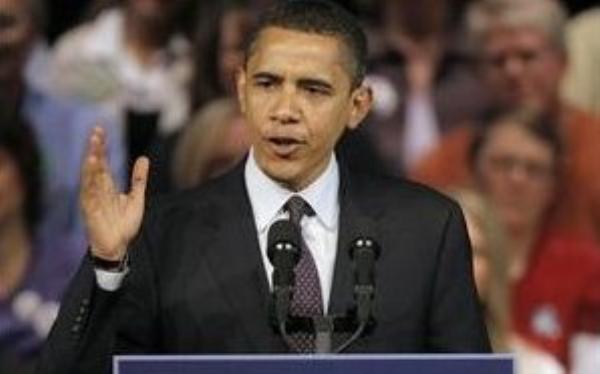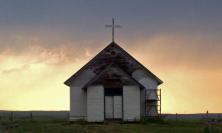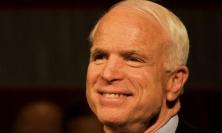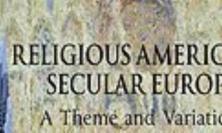What is it about the president-elect that has enabled him to have such a transformative effect on the political landscape of the United States? Gregory Chisholm SJ looks at the background and vision of a man whose political success is posing a challenge even for his supporters
The sharp and angular features of his face sit handsomely on the even field of his mocha skin. The very dark eyes, set deeply beneath the two thick black horizontal lines of his eyebrows, are compelling, and even kind, when he faces the camera. There appears to be no guile, no cynicism, and no anger brimming over, only resolve. His quick smile does not relieve the angular severity as much as it heightens the fullness of his lips and the breadth of his nose. This facial image is framed by a closely cropped helmet of fuzzy black hair which fades to the mocha at its borders. He appears to be the champion university distance runner or possibly a recently hired assistant professor. Nevertheless in so many quarters of the United States, and particularly among partisans of the Republican Party, he scares the daylights out of people.
When Barack Hussein Obama speaks it is with the precision of a sage and the cadence of an evangelist. His head and hands rise and fall rhythmically with his speech to build his arguments. They swing left and right to encompass his usually vast audiences. He treats the listener seriously and respectfully and invariably garners the same in return from the throngs in attendance at his campaign presentations. In the United States we have never seen this on the national stage before. Senator Obama is a black man who neither channels jingoistic American muscularity nor angry American radicalism. He has not been born of the black American neo-conservative movement and he is not an acolyte of the hierarchs of the Civil Rights era. Yet this uniqueness, this in-between-ness, is not without substance and for many that is absolutely frightening.
At an October Town Hall campaign meeting in Lakeville, Minnesota hosted by Senator John McCain, the Republican opponent, a Republican supporter stood and announced that he was “scared” at the prospect of an Obama presidency. When Senator McCain attempted to diffuse the man’s anxiety by defending Senator Obama’s character and patriotism, he was roundly booed by his own assembled supporters. Some at the meeting went on to call Obama a “terrorist”, a “liar”, an “Arab” and a “Socialist.” The character of this visceral fear in the minds of some like-minded citizens has been matched only by the eschatological fear voiced by some American bishops of an Obama presidency. The Archbishop of Denver in Colorado calls him the most committed “abortion-rights” presidential candidate since the Supreme Court decision in 1973 which gave American women the right to choose whether or not to have an abortion.[1] His comments were only the most direct among several Episcopal commentaries warning of the loss of our national soul, should an abortion-rights candidate prevail. Finally, and most disturbing, there were the revealing National Public Radio interviews this past summer which sought to assess Obama’s appeal or lack thereof among white Catholic voters in enclaves of European descendents. These are the so-called “swing” voters whose political allegiances are far from fixed. One interviewee expressed the fear that “if we put Obama in the White House there will be chaos.”[2] The essence of her fear was that an Obama presidency would free blacks to seek retribution for centuries of mistreatment.
The substance, then, of what scares many Americans lies in Obama’s image as a dangerous foreigner, a moral cancer and a racial nightmare. Even as he presents a public visage which is wholesome, welcoming, competent and attractive, he must confront a similar xenophobia, moral critique and racial fear to that which confronted the newly freed slaves in the latter part of the 19th Century.
Historian W.E.B. DuBois in his 19th Century classic, The Souls of Black Folk[3] attempts to argue against these attitudes by touting the positive contributions of the former slaves to American culture. In the late 19th Century a myth of blackness, nevertheless, would take root in the mind of immigrants and United States natives which would result in the most far-reaching and demeaning legal segregation of people America has known. The effects of “Jim Crow”, as American segregation was called, would extend from the separate use of public toilets to separate seats in public conveyances to separate places of learning to separate opportunities for economic and political advancement. The various institutions of the society would actively cooperate in this discrimination for nearly 100 years: government, business and religion. Neither man nor woman would be unaffected by the racial attitudes regarding black Americans. All Americans would know that blacks, regardless of their manumission, their citizenship and their suffrage, were at the lowest rung of the nation’s social structures. This was a pervasive condition which often left blacks frustrated and angry, while giving non-blacks a sense of unrealistic entitlement.
I believe that I first came to see the enormous power of Senator Obama’s candidacy for the Presidency when he had to confront this legacy directly in the Spring of this year. His critics sought to derail his candidacy by characterizing his association with the black pastor of his church in Chicago, Rev. Jeremiah Wright, as nearly treasonous. Several of the pastor’s sermons were edited and broadcast along the internet. The edited segments included language strongly critical of American policy overseas, critical of the legacy of America’s domestic racial policy and reflective of the black liberation theology of which Rev. Wright was an early advocate. Senator Obama publicly disavowed the excerpted comments of his pastor of 20 years. He also used the situation as an opportunity to offer public statements on race which were nothing short of breathtaking.
In a manner which was as direct as I had ever seen him he told his story about coming to self-understanding as a black man, raised by a white mother and grandmother. He became husband to the daughter of American slaves and father to his two well loved children. “I chose to run for president at this moment in history,” he said, “because I believe deeply that we cannot solve the challenges of our time unless we solve them together, unless we perfect our union by understanding that we may have different stories, but we hold common hopes.”[4] His personal story does not make him the most conventional of presidential candidates, he admits. However, the racial complexity of his history “has seared into my genetic makeup the idea that this nation is more than the sum of its parts — that out of many, we are truly one.”[5]
This call to unity was an early hallmark of his campaign strategy. His race gave that call a credibility it never had in earlier presidential contests. How much unity might George W. Bush or John McCain call forth on the campaign trail without leaving the strong impression among those at the margins of American society that they are not entirely included in the vision? While condemning some of Rev. Wright’s comments he explains that the pastor, his church and the African American community to which he ministers are an indelible part of whom Senator Obama has become and who he is becoming. “I can no more disown him than I can disown the black community,” Obama argues. “I can no more disown him than I can disown my white grandmother…these people are a part of me. They are a part of the country that I love.”[6]
Within his speech he goes on to own the anger which is the most glaring fruit of American racial segregation. Yet he also owns the frustrations which the racially entitled have felt as a result of failed and failing economic policies. He owns the bitterness of the largely white middle class, which is neither guaranteed health protection nor affordable quality education for their children. Senator Obama lives these two polarities.
The genius of his remarks is that he expresses the absolute requirement that black aspirations must be bound to the desire for protection and opportunity sought by the American middle class. White entitlement, on the other hand, must take seriously the legitimate critique of American society advanced by generations of black Americans. Thus a new lens is being formed through which Americans can view the fabric of our society: our defense, the employment of our citizens, the responsibility of our businesses, and the care of our families. What is entirely new in the history of American leadership is that the purview of Senator Obama's current reevaluation of our landscape knowledgably encompasses the bottom rung of the American social ladder, as well as its middle, in order to forge a clearer vision for our country. A happy consequence of such a determined effort to forge a more perfect union is that the respect and inclusion of blacks has usually always fostered the advancement of others at the margins, including racial minorities and women, as well as gays and lesbians.
Senator Obama concludes his speech by describing his overall agenda. “I would not be running for President,” he says, “if I didn't believe with all my heart that this is what the vast majority of Americans want for this country. This union may never be perfect, but generation after generation has shown that it can always be perfected.”
There is something here which appeals to and is understood by the many. Given the positive reception which Obama has had among young adults, women, ethnic groups, immigrants and the working classes, one might argue that he possesses an almost Pentecostal character in the witness he gives. Like Peter in the Acts of the Apostles he speaks in a such a way that even “Parthians, Medes, and Elamites”[7] hear him clearly in their own tongues. He speaks in such a way that the hearts and minds of many are moved to confidence and hope. Sadly this does not include the xenophobes, neither does it include many ecclesiastics and it cannot include racial purists. Yet it does include me. And dare I say that in this Senator Obama scares me?
My own journey as an American Catholic priest has been burdened by the strong distinction which seems to exist between the ideals and the reality of our government, regarding the blindness of its justice and equality of opportunity. I have found that a similar distinction exists in the life of the American Church between its ideals and its reality. In the late 1960’s, for example, Justice Clarence Thomas of the United States Supreme Court was a Catholic seminarian preparing for the Diocese of Savannah. He had been raised a Catholic in the segregated black life of Savannah, Georgia. In the seminary, however, he encountered much more than the usual role distinctions which are customary in the life of the Church. He met with racial antagonism, racial avoidance and racial name calling. As the world outside the seminary became more sensitized to black demands for justice, the seminary remained oblivious. Thomas left the seminary in frustration and anger. In remembering those years Justice Thomas commented that if the Church had approached racial justice with the energy with which it approaches the issues surrounding abortion rights, he would be a Catholic priest rather than a Supreme Court Justice today.[8]
It scares me that Senator Barack Obama’s victory this past week in the national elections has encouraged in me a belief that our country has come closer to the Lockean ideals which animated the establishment of our republic 221 years ago. After all, I have lived so long without such optimism. Yet I am not alone in this fear. At a recently held Mass of Thanksgiving at my church for the Obama victory, the senior parishioner of my congregation, Mrs. Ella Rhea Gray, a 96 year old, rose to give testimony. She told the story of how her great grandson had called her on the afternoon of the American elections to express his assurance in the eventual victory of Senator Obama. However, Mrs. Gray has seen a lifetime of sadness around failures to achieve one’s desire and has learned to protect both heart and mind. She told her great grandson not to get his hopes up too high, because they probably “won’t let a black man into the White House.” As she stood before the congregation that evening she thanked God that she had lived long enough to see the day that a black man would be President of the United States. She also thanked God that her great grandson could grow up in a time when the belief that “All men are created equal…”[9] applies even to black men and black women.
Gregory Chisholm SJ is African American. He was born into a Roman Catholic family and raised in New York City. He belongs to the New England Province of the Society of Jesus. Currently he is pastor of St. Patrick Church in Oakland, California and an Assistant Professor of Pastoral Theology at the Jesuit School of Theology in Berkeley, California. Fr. Chisholm is a 1992 graduate of Heythrop College, University of London.
[1] Chaput, Most Rev. Charles, “Little Murders”, Dinner Speech at Educating on the Nature and Dignity of Women, October 17, 2008
[2] All Things Considered, “York Voters Express Post-Election Hopes, Fears” , National Public Radio, October 24, 2008
[3] W.E.B. DuBois, Souls of Black Folk, Mineola, NY, Dover Edition, 1994.
[4] Obama, Barack, “A More Perfect Union”, Speech, March 18, 2008
[5] Ibid.
[6] Ibid.
[7] Acts of the Apostles 2:9
[8] Thomas, Justice Clarence, My Grandfather’s Son, Harper Collins Publishers, New York, 2007
[9] Jefferson, Thomas, “The United States Declaration of Independence,” July 4, 1776
Read more of Thinking Faith's coverage of the US elections:
![]() A Tale of Two Presidents – Michael Sean Winters
A Tale of Two Presidents – Michael Sean Winters
![]() Republicans in the political wilderness – Keith McMillan SJ
Republicans in the political wilderness – Keith McMillan SJ
![]() Obama and the politics of community organising – Austen Ivereigh
Obama and the politics of community organising – Austen Ivereigh
![]() Blessed and Broken: How Religion Infuses and Confuses American Presidential Politics – Paul Brian Campbell SJ
Blessed and Broken: How Religion Infuses and Confuses American Presidential Politics – Paul Brian Campbell SJ






